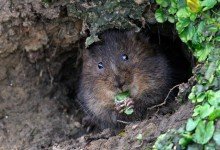Dorset Wildlife Trust (DWT) is pleased to have received notification of a water vole sighting on the River Cerne in Forston, near Dorchester.
This is a welcome sighting as the water vole is Britain’s fastest declining mammal. This is the first recorded sighting for many years on the River Cerne which runs into the River Frome.
An image of the water vole was captured on a wildlife trap camera by local resident, Gill Reece. Gill said, “We moved here 10 years ago and have cared for and, we hope, improved the riverside habitat by adding native plants and trees. We’ve seen evidence of otters in recent years, and the icing on the cake now is the return of the water voles.”
Nationally, the water vole is in decline due to a variety of reasons including predation by the American mink, and habitat loss. However, Dorset is bucking the trend and remains a stronghold for them.
DWT’s River Catchment Team Manager, Amanda Broom, said, “It’s such a joy to see this picture and know that our fantastic rivers and wetlands in Dorset are home to this captivating species. Water voles are under intense pressure from American mink and habitat loss, yet it shows with the right care by residents and landowners, water voles can still flourish.”
Water voles with their stubby noses, short tails and almost imperceptible ears held flat against their heads are strict herbivores, eating up to 250 different species of vegetation, including water forget-me-not and flag iris. These lush bankside plants also help water voles shelter from predators.
Signs of the presence of water voles on a river include their droppings, which are small green pellets, feeding remains and burrows. If you see a water vole, or evidence of one please do not disturb it, and inform DWT via [email protected] or phone the Dorset Wild Rivers Team on 01305 264620.
If you’re near rivers this summer, please adhere to bio security best practice with the ‘check, clean, dry’ procedure to avoid the spread of invasive non-native species into our rivers.












